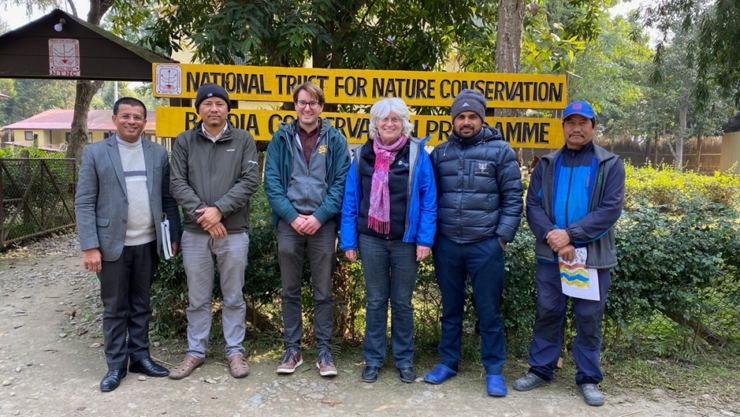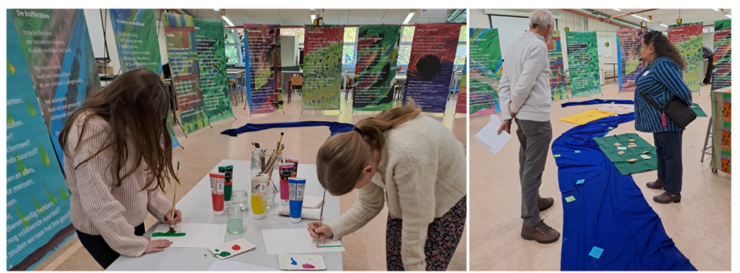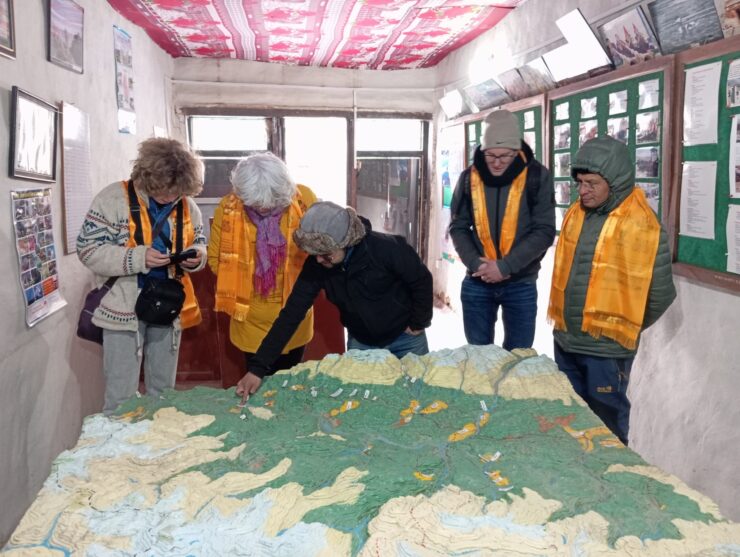Landscape stewardship for water and grassland management strategies (WP2)
WP 2 finalised the poetry route In the Buffer zone Farms, Families and Wildlife in both a Nepali and English language. With the production now taking place in Nepal the WP 2 team is looking for a sound strategy of using the poetry route for social dialogue and community conversations in the NTNC buffer zone communities.
With Prakash Raj Bista, Ajit Tumbahangphe, Jan Fliervoet, Walter Verspui, Umesh Paudel and Naresh Subedi we documented the experiences with the poetry route and with RiverSideVillage the in the chapter Community art and communication: crafting sustainable landscape stewardship in Terai Arc, Nepal in Collaborative Change: Towards Inclusive Rural Communication Services, a book published by FAO and IAMCR.
The chapter is published in part II focusing on participatory, inclusive and negotiated qualities of the approaches and strategies. Our chapter 8 adopts the RCS framework and zooms in on the design and facilitation of two innovative community-art-based RCS strategies: serious gaming and poetic-inquiry. These RCS strategies are applied in the NWO funded project exploring rural communication and mediated participation in the Terai Buffer Zone in Nepal integrating the social-ecological context and rural communication processes into stewardship strategies for family farming in an area near tiger habitats in Nepal’s natural reserves, integrating a nature-conservation perspective with a rural-livelihoods perspective.

Through the two innovative, community-art-based RCS strategies, the farming families express how they interact with water systems, natural grasslands and wildlife populations in the buffer zone. Participation and horizontal communication are central to the strategies, and facilitators are seen as process designers, creating space and crafting routes for change. Based on the two community-art methodologies, the voices of farming families are heard through active social imagination.
The book is freely available at: https://openknowledge.fao.org/items/dc9b65ff-4bfd-4595-9c0b-e53e17f5d803

A Dutch language version of the poetry route has recently been exposed during the Sustainability festival organised by the Municipality of Rheden. On that occasion we also showed a poem with a painted background with the title Wolf and summer bird. Children were invited to paint nature themes while adults observed the poetry route and engaged in conversations on stewardship and wildlife conservation. In the centre of the exhibition hall the game River Side Village was laid and turned out to create a rapid insight on the Terai eco-system and the challenges for the families in the buffer zone. The experiment to bring the Nepali stewardship narrative to the Netherlands, where the societal debate over the presence of the wolf features high on the agenda, seems promising. We will further explore if the Nepali poetry route may inspire similar stewardship debates as NTNC is dedicatedly thriving for in the Terai. See: https://www.linkedin.com/feed/update/urn:li:activity:7295029454974701569/

In follow up of the visit in July 2024 by Nepali colleagues we also explore the option to design and implement a training on contemporary methods for rural communication services including. poetic inquiry, serious gaming and social imaginaries for stewardship, whereby we specifically build on the experiences obtained with the design and development of the poetry route and RiverSideVillage the game.
From March 5–March 17, 2025, researchers from Van Hall Larenstein University of Applied Sciences (HVHL) have been at work in Nepal invited by NTNC colleagues of the Annapurna Conservation Area Project (ACAP), Lomanthang. Similar to activities in Bardia, scoping studies and community art workshops have been undertaken in villages. This will result in a new poetry route ‘’Welcome to Namasung and Dhye, our mountain villages’’

In March 2025, HVHL researcher Sarah Zernitz gave a guest lecture for students of the minor International Wildlife Management at HVHL in which they work with the ‘Conflict to Coexistence Approach’ of the WWF on human-wildlife conflict. During the lecture the audience has been presented two examples of innovative strategies for enhancing community-based landscape stewardship by farming families in the Terai Arc Landscape in Nepal. (https://www.linkedin.com/feed/update/urn:li:activity:7307678324049207297/?actorCompanyId=97428799).

